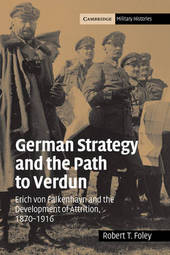
|
German Strategy and the Path to Verdun: Erich von Falkenhayn and the Development of Attrition, 1870-1916
Hardback
Main Details
| Title |
German Strategy and the Path to Verdun: Erich von Falkenhayn and the Development of Attrition, 1870-1916
|
| Authors and Contributors |
By (author) Robert T. Foley
|
| Series | Cambridge Military Histories |
|---|
| Physical Properties |
| Format:Hardback | | Pages:316 | | Dimensions(mm): Height 229,Width 161 |
|
| Category/Genre | First world war |
|---|
| ISBN/Barcode |
9780521841931
|
| Classifications | Dewey:940.31 |
|---|
| Audience | | Professional & Vocational | | General | | Tertiary Education (US: College) | |
|---|
| Illustrations |
5 Maps; 17 Halftones, unspecified
|
|
Publishing Details |
| Publisher |
Cambridge University Press
|
| Imprint |
Cambridge University Press
|
| Publication Date |
6 January 2005 |
| Publication Country |
United Kingdom
|
Description
Almost 90 years since its conclusion, the battle of Verdun is still little understood. German Strategy and the Path to Verdun is the first detailed examination of this seminal battle in the English language to be based on research conducted in archives long thought lost. Material returned to Germany from the former Soviet Union has allowed for a reinterpretation of Erich von Falkenhayn's overall strategy for the war and of the development of German operational and tactical concepts to fit this new strategy of attrition. By taking a long view of the development of German military ideas from the end of the Franco-German War in 1871, German Strategy and the Path to Verdun also gives much-needed context to Falkenhayn's ideas and the course of one of the greatest battles of attrition the world has ever known.
Author Biography
Robert T. Foley is a Lecturer in the Defence Studies Department, King's College London at the Joint Services Command and Staff College. He is the editor and translator of Alfred von Schlieffen's Military Writings, 2002.
Reviews'This book is far more than a study of a grim battle ... Foley has written a book which will be referred to repeatedly.' Open History
|